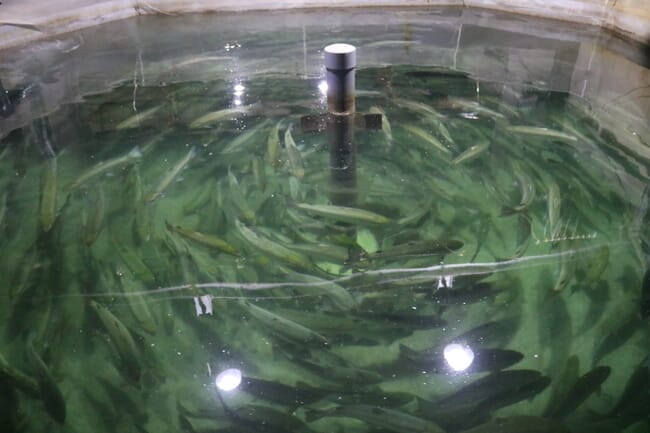At the Economist Virtual World Ocean Summit on 4 March, Håkon Andre Berg, CEO of Salmon Evolution, spoke about the role land-based salmon farms – including recirculation systems – are likely to play in the sector’s growth trajectory.

Berg noted that Salmon Evolution’s land-based facility is not a RAS, but uses a hybrid flow-through system. This recirculates some of the culture water while pumping in fresh seawater and, according to Berg, allows the company to keep water treatment costs low, while getting the environmental benefit of recirculation.
He explained that many proponents of RAS technology have highlighted the positive biosecurity and environmental outcomes when compared to conventional marine net pens. When asked if the high stocking densities needed to make land-based farming profitable made the facilities similar to “battery farming”, Berg argued that, despite welfare concerns, he was, “certain that fish welfare is dramatically improved [when] we take fish on land.”
Why land-based production can lead to better welfare outcomes
Berg told delegates that safeguarding fish welfare in land-based facilities was different compared to ocean net pen farming. Fish in land-based systems face different environmental stressors and may not have the same disease and parasite burdens as their sea-faring counterparts.
He explained that, despite the higher stocking density in Salmon Evolution’s hybrid flow-through system, the fish might be healthier overall because their environment is being actively managed. He pointed out that technicians can constantly monitor levels of oxygen, CO₂ and total ammonia nitrate (TAN) in the water. They can also respond to any health changes and treat the fish in the water at any given time. It’s more difficult to achieve this type of management in ocean pen farming, so Berg believes that fish welfare isn’t threatened by the high stocking density in the tanks.
He backed up his argument with data from Norway’s salmon industry, which shows that the average mortality rate for salmon raised in net pens over the last decade has increased to 18-20 percent. Meanwhile, the mortality rate for cleanerfish – such as wrasse and lumpfish – used in salmon net pens can be as high as 100 percent. The welfare implications of one in five salmon dying at sea and losing entire schools of cleanerfish might make critics see land-based systems in a new light.
Moving forward, Berg hopes to find genetic solutions for fish raised in land-based facilities. Currently, aquaculture genetics focuses on traits that will give fish an advantage in ocean pens – a premium is placed on disease and parasite resistance. Fish raised in RAS farms may not need the same traits. He is partnering with Benchmark Genetics to develop fish that can grow quickly and remain healthy in land-based facilities.
The Economist Virtual World Ocean Summit is running from 1 to 5 March.




